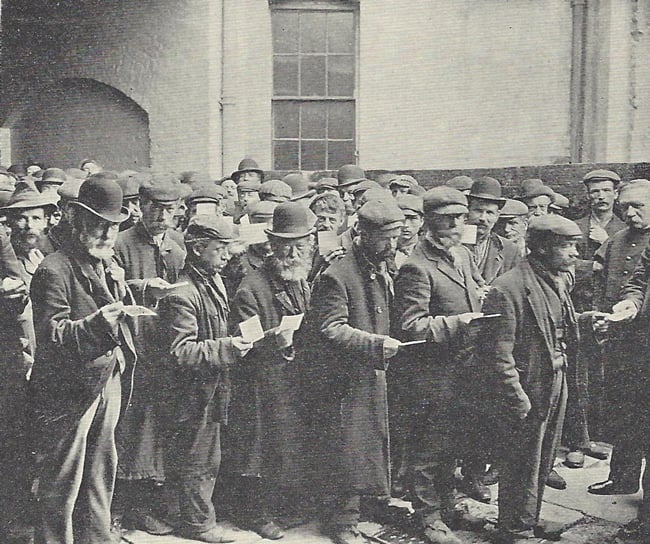On Tuesday the 2nd of January, 1894 The Aberdeen Press and Journal published an article that took a revelatory look at the unemployed of London and its impact on poverty:-
THE LEGAL POOR OF LONDON
The statistics relating to poor law administration in London this Christmas tell a sorry tale of poverty and suffering.
At the end of last year, the outlook was not a bright one, as pauperism then showed a large increase upon the corresponding period of 1891, and there is now recorded the disagreeable fact that the ratepayers are providing at this season for 10,000 paupers over above the high figures of December 1892.

AN ENORMOUS NUMBER
There are 108,000 persons today in receipt of indoor and outdoor poor relief.
This enormous number undoubtedly indicates the existence of a serious condition of things; and it is certainly abnormal, for we must go back as far as 1872 to find something like a parallel.
In January last pauperism went up beyond the figures for the end of the old year. It then fell slightly, though still showing a large increase on the corresponding periods of the previous year. A rise, however, was again apparent in July, and it has since continued at a rapid rate, and may be expected to go higher.
STRIFE IN THE LABOUR MARKET
For much of this poverty, and for a very great deal of the distress which is behind it and which does not come within official recognition, the long strife in the labour market and the consequent dislocation of trade, together with the depression in nearly all branches of industry left over from 1892, must be held responsible.
It is well known that London feels very quickly the effects of failing trade in the country and it will be gathered from the figures given in this annual review, that the unemployed agitations, beginning as they did this year in the very middle of the summer, pointed to the existence of an unusual amount of distress of a severe form.
PROFESSIONAL AGITATORS
The methods of professional agitators who attach themselves to bodies of unemployed workmen are in many ways objectionable. They certainly fail to win sympathy.
The agitator does not as a rule find his way to the workhouse in hard times, because in the exercise of his profession he can do much better outside.
It is the unfortunate workman out of employment whose cause he champions who falls under the ban of pauperism.
TRUTHFULLY UNEMPLOYED
Mr Hedley, the Local Government Board inspector for the Metropolis, has pointed out that London can on any day of the year supply thousands who could truthfully represent themselves as unemployed – men who have not for long, if ever, been in regular employment, and who would not take it if offered.
But it will be difficult for anybody to say this Christmas, with a full knowledge of the facts, that the cry of distress comes from this class of the unemployed alone, and that the applications to the poor law have been of much the usual character.
